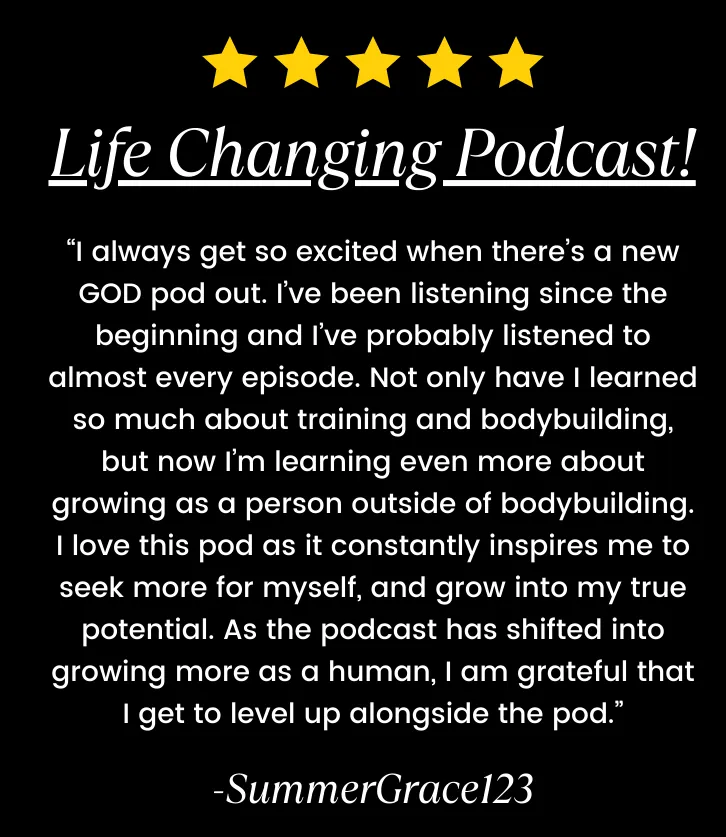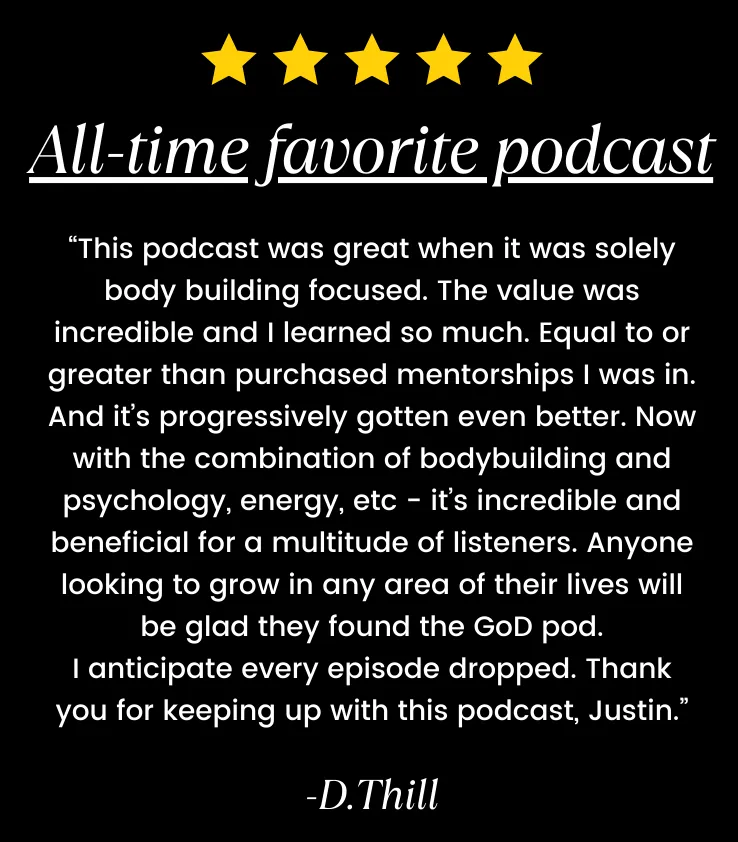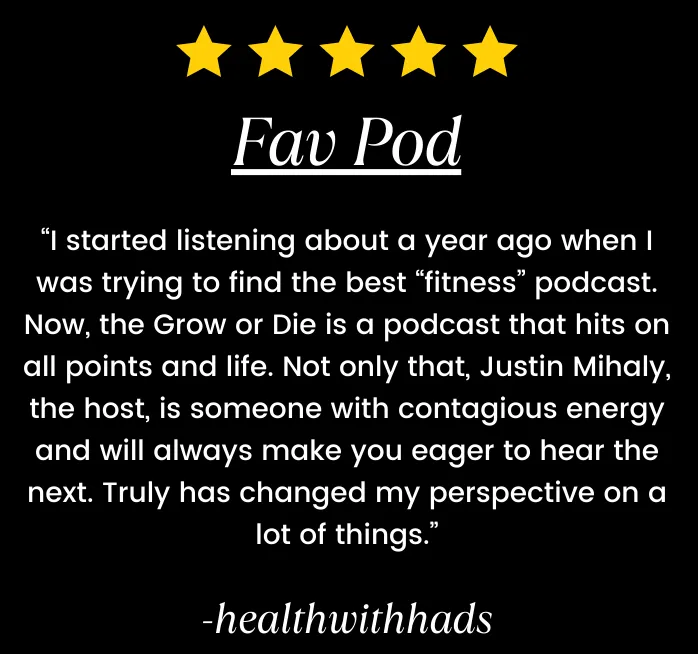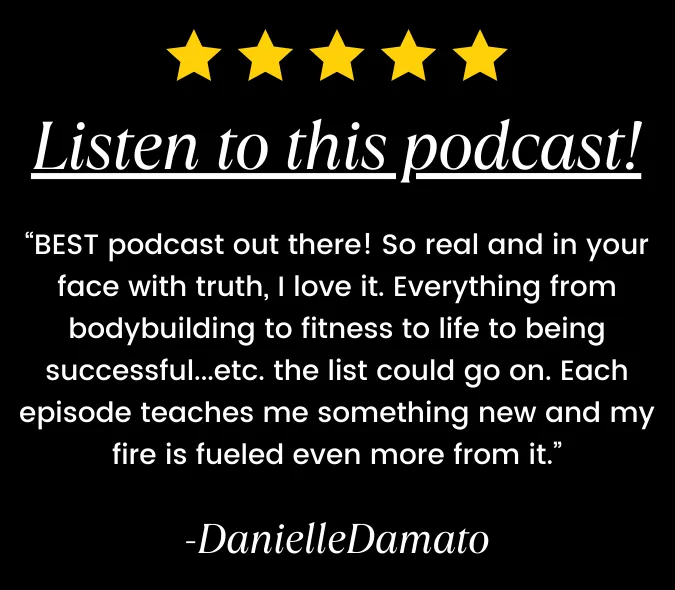
Welcome to The Grow Or Die Podcast – your ultimate hub for fitness and entrepreneurship.
Join Justin Mihaly as we explore nutrition, training, bodybuilding, and more.
Beyond the gym, discover the realities of business ownership, mindset tips, and captivating discussions.
Hosted fearlessly, we spill the tea and push boundaries because growth is the essence of life.
Tune in for insights that elevate your fitness and entrepreneurial journey.
Ready to grow or die?
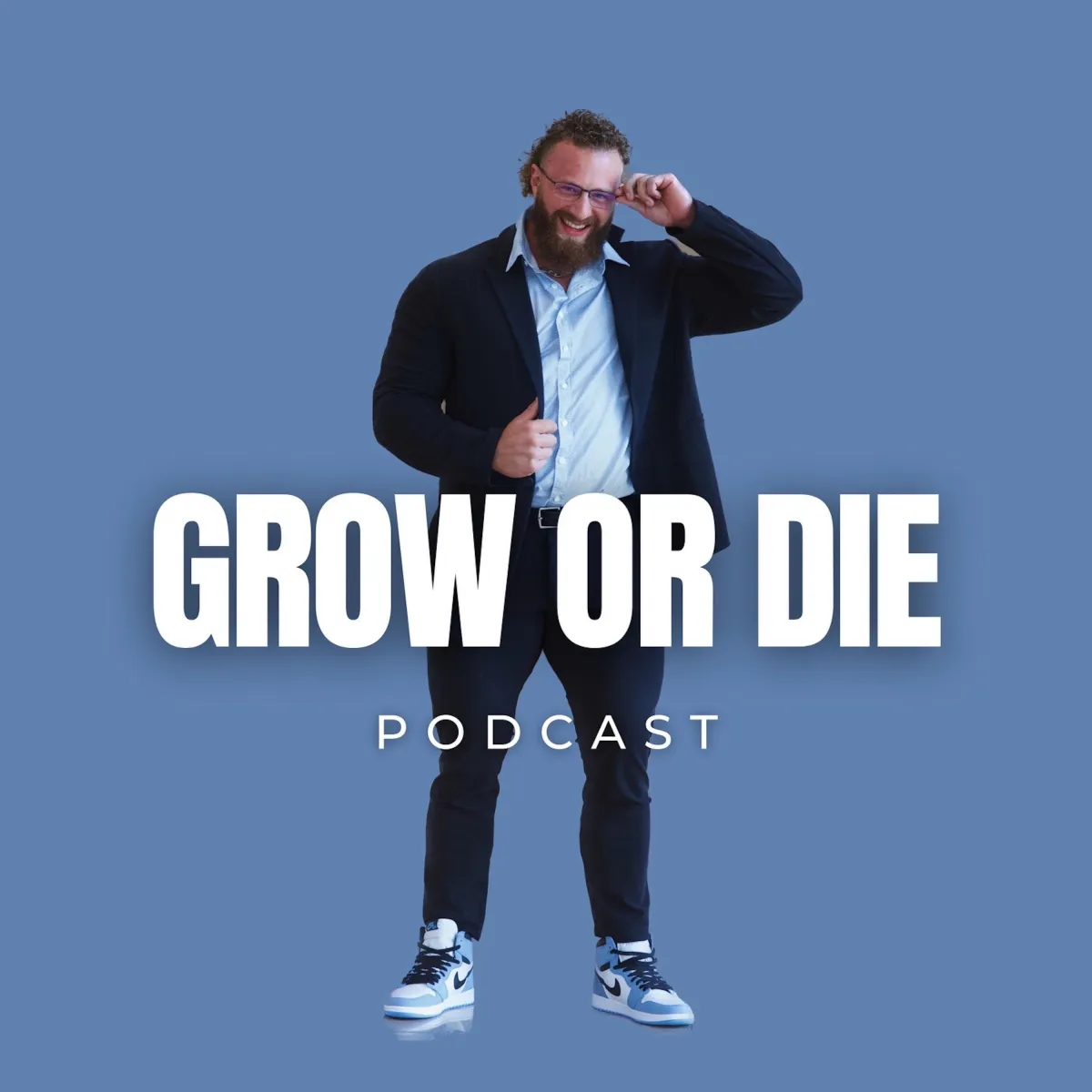

EP 405: Dieting Differences Between Men and Women
Dieting Differences Between Men and Women
In the latest episode of the Grow or Die podcast, Justin Mihaly delves into the physiological differences between men and women regarding dieting and fat loss. This episode sheds light on how hormones like estrogen, growth hormone, and others influence these processes differently in men and women.
The Role of Iron in Fat Oxidation
Justin starts by highlighting the importance of iron in the body, particularly for women. Iron plays a crucial role in synthesizing carnitine, essential for fat oxidation. Women often suffer from iron deficiency due to menstrual blood loss and dietary choices that exclude iron-rich foods like red meat. This deficiency can lead to symptoms like brittle nails, poor skin health, and brain fog.
Hormonal Differences: Estrogen and Fat Storage
Estrogen significantly impacts fat storage and metabolism in women. Women tend to have more fat cell receptors in areas like the hips and thighs due to higher estrogen levels. These receptors, specifically alpha-2 adrenergic receptors, make it more challenging for women to lose fat in these areas. In contrast, men have more beta-2 adrenergic receptors, which are more efficient at releasing fat from cells for energy.
Yohimbine and Fat Loss
Yohimbine, a supplement that targets alpha-2 adrenergic receptors, is highlighted as particularly effective for women during fat loss phases. Justin explains that while Clenbuterol acts on beta-2 receptors and is beneficial for men, Yohimbine’s effectiveness on alpha-2 receptors makes it more suitable for women, helping them shed stubborn fat in areas like the hips and thighs.
Estrogen's Impact on Fat Metabolism
Estrogen plays a more significant role in regulating fat metabolism in women than in men. Justin notes that lowering a man's estrogen levels doesn't drastically affect fat loss but can reduce subcutaneous water retention. For women, maintaining balanced estrogen levels is crucial for effective fat metabolism and overall hormonal health.
Dietary Fat and Hormone Synthesis
Dietary fat intake is essential for both men and women for hormone synthesis. Women, in particular, need sufficient dietary fat to maintain regular menstrual cycles and support overall health. Justin suggests that women should aim for about 35% of their daily caloric intake from fat, adjusting as needed during specific phases like prep or fat loss.
Omega-3 and Omega-6 Fatty Acids
Justin emphasizes the importance of balancing omega-3 and omega-6 fatty acids. An imbalance, especially with high omega-6 intake, can lead to inflammation and health issues. Omega-3s, found in supplements like krill oil, are crucial for reducing inflammation and supporting overall health, particularly during menstruation and pregnancy.
Protein Intake and Menstrual Cycles
During the luteal phase of the menstrual cycle, women’s protein needs increase due to the role of progesterone in thickening the endometrial lining. Justin advises women to increase their protein intake during this phase to support this process and overall health. He recommends spreading protein intake throughout the day and using supplements like hydrolyzed whey to aid digestion and absorption.
Practical Tips for Women in Dieting
Justin concludes with practical advice for women regarding dieting and fat loss:
- Monitor Iron Levels: Ensure sufficient intake of iron-rich foods or supplements, especially if you have heavy menstrual cycles.
- Balance Hormones: Use supplements like DIM to support estrogen metabolism and avoid drastic hormone level changes that can disrupt fat loss and overall health.
- Optimize Dietary Fat: Maintain adequate dietary fat intake to support hormone synthesis and menstrual cycle regularity.
- Incorporate Omega-3s: Supplement with omega-3 fatty acids to reduce inflammation and support overall health.
- Adjust Protein Intake: Increase protein intake during the luteal phase to support the body’s increased demands.
Conclusion
Understanding the physiological differences between men and women in dieting and fat loss can significantly impact your approach and results. By tailoring your diet and supplementation to these unique needs, you can optimize your health and achieve your fitness goals more effectively. Listen to the full episode of the Grow or Die podcast for more in-depth insights and practical advice from Justin Mihaly.

Welcome to The Grow Or Die Podcast – your ultimate hub for fitness and entrepreneurship.
Join Justin Mihaly as we explore nutrition, training, bodybuilding, and more.
Beyond the gym, discover the realities of business ownership, mindset tips, and captivating discussions.
Hosted fearlessly, we spill the tea and push boundaries because growth is the essence of life.
Tune in for insights that elevate your fitness and entrepreneurial journey.
Ready to grow or die?

EP 405: Dieting Differences Between Men and Women
Dieting Differences Between Men and Women
In the latest episode of the Grow or Die podcast, Justin Mihaly delves into the physiological differences between men and women regarding dieting and fat loss. This episode sheds light on how hormones like estrogen, growth hormone, and others influence these processes differently in men and women.
The Role of Iron in Fat Oxidation
Justin starts by highlighting the importance of iron in the body, particularly for women. Iron plays a crucial role in synthesizing carnitine, essential for fat oxidation. Women often suffer from iron deficiency due to menstrual blood loss and dietary choices that exclude iron-rich foods like red meat. This deficiency can lead to symptoms like brittle nails, poor skin health, and brain fog.
Hormonal Differences: Estrogen and Fat Storage
Estrogen significantly impacts fat storage and metabolism in women. Women tend to have more fat cell receptors in areas like the hips and thighs due to higher estrogen levels. These receptors, specifically alpha-2 adrenergic receptors, make it more challenging for women to lose fat in these areas. In contrast, men have more beta-2 adrenergic receptors, which are more efficient at releasing fat from cells for energy.
Yohimbine and Fat Loss
Yohimbine, a supplement that targets alpha-2 adrenergic receptors, is highlighted as particularly effective for women during fat loss phases. Justin explains that while Clenbuterol acts on beta-2 receptors and is beneficial for men, Yohimbine’s effectiveness on alpha-2 receptors makes it more suitable for women, helping them shed stubborn fat in areas like the hips and thighs.
Estrogen's Impact on Fat Metabolism
Estrogen plays a more significant role in regulating fat metabolism in women than in men. Justin notes that lowering a man's estrogen levels doesn't drastically affect fat loss but can reduce subcutaneous water retention. For women, maintaining balanced estrogen levels is crucial for effective fat metabolism and overall hormonal health.
Dietary Fat and Hormone Synthesis
Dietary fat intake is essential for both men and women for hormone synthesis. Women, in particular, need sufficient dietary fat to maintain regular menstrual cycles and support overall health. Justin suggests that women should aim for about 35% of their daily caloric intake from fat, adjusting as needed during specific phases like prep or fat loss.
Omega-3 and Omega-6 Fatty Acids
Justin emphasizes the importance of balancing omega-3 and omega-6 fatty acids. An imbalance, especially with high omega-6 intake, can lead to inflammation and health issues. Omega-3s, found in supplements like krill oil, are crucial for reducing inflammation and supporting overall health, particularly during menstruation and pregnancy.
Protein Intake and Menstrual Cycles
During the luteal phase of the menstrual cycle, women’s protein needs increase due to the role of progesterone in thickening the endometrial lining. Justin advises women to increase their protein intake during this phase to support this process and overall health. He recommends spreading protein intake throughout the day and using supplements like hydrolyzed whey to aid digestion and absorption.
Practical Tips for Women in Dieting
Justin concludes with practical advice for women regarding dieting and fat loss:
- Monitor Iron Levels: Ensure sufficient intake of iron-rich foods or supplements, especially if you have heavy menstrual cycles.
- Balance Hormones: Use supplements like DIM to support estrogen metabolism and avoid drastic hormone level changes that can disrupt fat loss and overall health.
- Optimize Dietary Fat: Maintain adequate dietary fat intake to support hormone synthesis and menstrual cycle regularity.
- Incorporate Omega-3s: Supplement with omega-3 fatty acids to reduce inflammation and support overall health.
- Adjust Protein Intake: Increase protein intake during the luteal phase to support the body’s increased demands.
Conclusion
Understanding the physiological differences between men and women in dieting and fat loss can significantly impact your approach and results. By tailoring your diet and supplementation to these unique needs, you can optimize your health and achieve your fitness goals more effectively. Listen to the full episode of the Grow or Die podcast for more in-depth insights and practical advice from Justin Mihaly.
GET VIP ACCESS NOW
Don't miss out on the inside scoop – subscribe today! Join our community of growth enthusiasts and be the first to access premium content that will fuel your fitness journey and entrepreneurial endeavors. Your path to personal and professional growth starts here. Enter your email now to unlock a VIP experience with The Grow Or Die Podcast!

